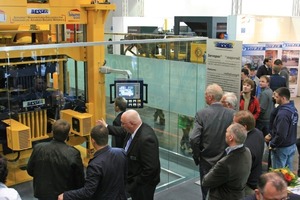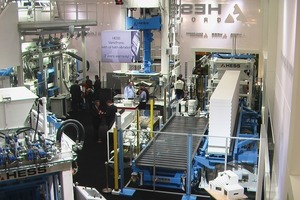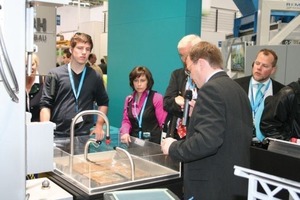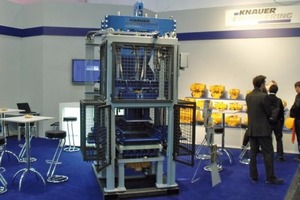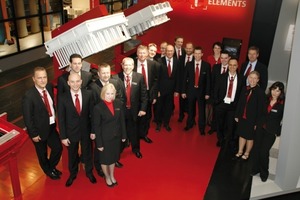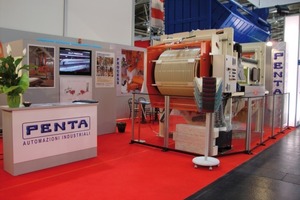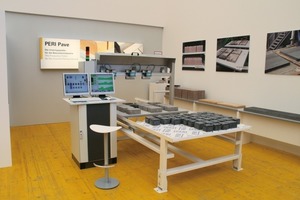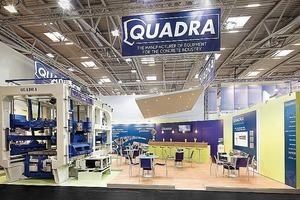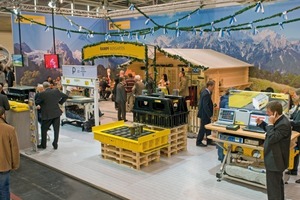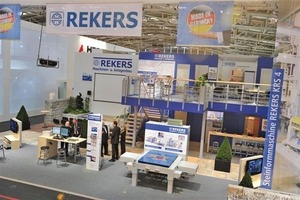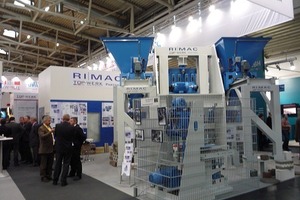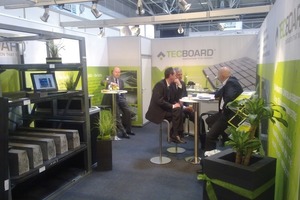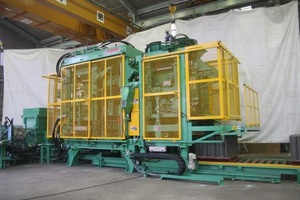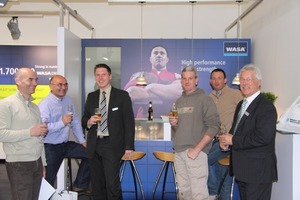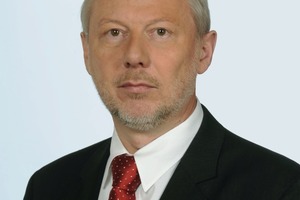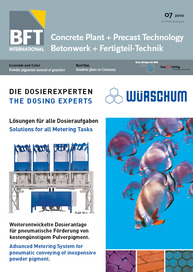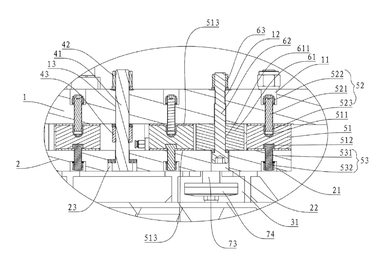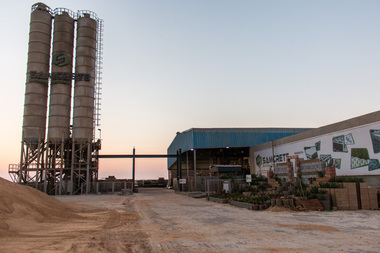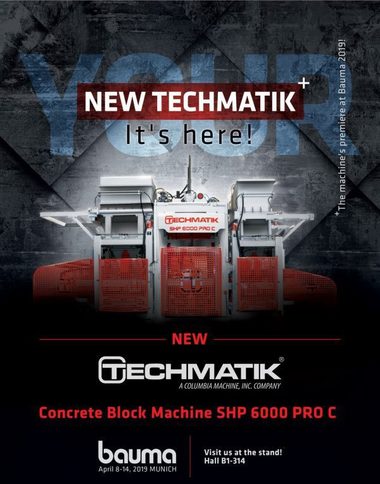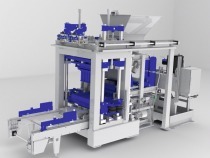Block machines, slab presses, surface finishing systems and
accessories
accessories
Blue sky, sunshine and many visitors – this was once again the setting of the 29th bauma, which was held at the end of April in Munich. As before, BFT INTERNATIONAL publishes a bauma review to report on the most important innovations presented at this industry show. The reviews are slightly more comprehensive this year because some of our readers were not able to attend the bauma due to the flight ban imposed on Europe following the impact of the Icelandic volcanic ash cloud. Browse through the following pages to get to know more about the innovations in the manufacture of concrete products that were first presented at the world’s largest industry show.
Besser Company
At bauma, the Servopac®, which made its European debut and the model 140/120 OMAG-Tronic, outfitted with the new OMAG-Tronic “S” vibration system, were the major features in the Besser stand. Using a combination of video, graphics and sample concrete units, Besser promoted the new S140 Big Board Splitter and inline product aging systems, the SAM or Stone Aging Machine for pavers, and the MAS, or Masonry Aging Systems, for retaining wall units and architectural block.
Crowds gathered to watch the Servopac’s fully automatic mold and height change being done in less than 5 minutes and marveled at its ease of operation.
The Servopac at the booth was equipped with a side core puller (a rear core puller is also available). The use of core pullers expands the variety of concrete products that can be produced on the Servopac. Many of the complex concrete unit designs popular today feature horizontal openings that are formed using a core puller. Some of these units are cored brick manufactured on edge, concrete units with fake mortar beds, retaining wall units with tongue and groove locking, and erosion control units.
The legendary OMAG-Tronic 140/120 drew a lot of attention from visitors anxious to learn about the new features including the OMAG-Tronic „S“ vibration system. This system reduces cycle time by up to one second while improving end product quality. OMAG-Tronic “S” vibration allows producers to reduce the amount of cement required in the mix. Additional machine innovations shown include the pneumatic tamper head quick locking device and top vibrators. All the features shown on the show machine are available as retrofits for existing machines.
The acquisition of Kraft Energy in April, just weeks before bauma, added concrete curing solutions to the product line. Staff in both the Besser stand and the Kraft stand shared the benefits, including having a wider range of resources available to producers for technical service and sales activities.
www.besser.com
FC Sonderkonstruktionen GmbH
At its stand, the company showed its “Softline Anticer” system. This aging machine makes it possible to age concrete products directly on the production board, i.e. within the production cycle. The system was named “Softline” because of the outcome achieved in terms of the final appearance of the concrete products: they look slightly less “antique” than known from other aging systems. Since the concrete products remain on the production board and are aged “in-line”, this technology is particularly well-suited to producing large-format slabs. Several other solutions that the supplier offers for the aging of concrete pavers and slabs often provided the basis for lively discussions between FC Sonderkonstruktionen and its customers visiting the stand at the Munich trade show.
In addition, a combined brushing and milling system was presented, which enables the simultaneous brushing and milling of concrete products.
Another innovation is the “coating line”, which applies the sealing coat to pavers and slabs. Again, this is proof of the current trend in the concrete products industry: end users increasingly expect paved areas to be dirt-repellent. As and when required, this coating technology may be complemented by IR or UV hardening, depending on the coating material to be applied.
Just recently, the new project engineer Bernd Rudler joined the team at FC Sonderkonstruktionen GmbH. His recruitment reaffirms the continuous growth and upward trend the company has been experiencing.
www.fc-maschinen.de
Friesische Maschinenbau GmbH & Co. KG
The most prominent exhibit on display at the Frima GmbH stand in Hall C1 was the HP1400 block machine with a pallet size of 1,400 x 1,300 mm. This machine has already been sold to the company Al Manaratain in Bahrain as part of a complete production line. The columns used for the machine have a diameter of 120 mm in the main frame and ensure reliable and accurate guidance of the tamper head and mold holder system.
For the production of insulating bricks, whose use has been mandatory for some years in the Gulf States to mitigate the impact of climate change, the machine on display at the bauma was fitted with a specially designed system. This is yet another contribution of the German engineering sector to reducing carbon emissions worldwide. During the hot summer months, up to 60% of the electricity is consumed by the operation of air-conditioning units. This share is reduced significantly when using insulating bricks in construction.
The mechanical height-dependent turn-off system that forms part of the Frima machine enables the production of wall blocks exactly to the specified height whilst any differences in the height of the base boards are compensated. This height-dependent turn-off system impresses with its simple yet very effective design. According to the manufacturer, it was the only system of this type shown at this year’s bauma.
Another innovation worth mentioning are the drives of the vibration units: the supplier uses a servomotor/converter combination where the converters were programmed specifically for the operation of the vibration units. Frima has thus developed a highly energy-efficient solution that also ensures perfect compaction of the products.
The control unit of the system is always equipped with a product tracking feature that automatically adjusts the parameters of the individual system units to the new products after product changeover. This system prevents errors and rejects, especially during product changeover, and thus also contributes to saving energy and resources. Frima uses a genuine 3D visualization, which makes machine setting and production monitoring much easier. The paving blocks finished on the new embossing line also attracted the interest of many visitors.
www.frima-emden.de
Hess Maschinenfabrik GmbH & Co. KG
Considering itself the world market leader in equipment and machinery for the concrete products industry, Hess set up a stand covering an area of over 680 m². The supplier presented the most important innovations in the product portfolio offered by the entire group. The RH 2000 concrete block machine was presented in a new design derived from the high-end machine RH 2000-2, which had been optimized and equipped with state-of-the-art technology in a joint effort undertaken by the sales, engineering and service departments in close collaboration with Hess customers. The outcome is the Multimat RH 2000-3 model. At the very heart of the RH 2000-3 is the new, highly dynamic hydraulic unit combined with an electronic axis controller. In this machine, two tamper head cylinders and a synchronous hydraulic control system were used to ensure appropriate motion of the tamper head. Pressure sensors are used to detect and signal filling level deviations within the mold so as to enable the operator to take appropriate corrective actions. A closed hydraulic/electronic control loop ensures the optimal positioning of the tamper head. The direct, highly dynamic control pattern moves the core and face mix filler boxes into their positions with pinpoint precision. This position is maintained very accurately during the movement of the agitator. As a result of the optimized hydraulic control, the RH 2000-3 once again offers reduced cycle times. As a matter of course, the new RH 2000-3 is equipped with the new oil bath vibration unit, which has been derived from the tried and tested Hess Variotronic system.
At this year’s bauma, the group of companies also showed its latest addition to the product range for the first time: the RH 760. Due to the high level of demand, particularly on the American market, Hess decided to once again develop a pure concrete block machine design in order to take a new approach to the market segment of block production. The positive experience gained with the hydraulic control unit used in the RH 2000-3 machine prompted Hess to also integrate this tried and tested unit in the RH 760 as part of the standard equipment package. The mold change system can be switched from manual to electric mode and vice versa to achieve shortest mold change times. Yet the top feature of this machine is its cycle time of under six seconds.
In addition, the Compact Expert module collects various readings from sensors fitted to the block machine. An extremely simple graphic representation of these values provides immediate insights into whether the machine and, in particular, the vibration system work in the optimal range. This, in turn, enables the operator to obtain specific information and guidance for required actions at the push of a button.
Hess also displayed safety features for the machines of the new RH series. The new safety package offered by the supplier includes a safety PLC control unit, which ensures that all machine features relevant to safety, such as protective grilles, light barriers or emergency stops, can be controlled and signaled. The functioning of the entire safety system is permanently monitored using the software.
www.hessgroup.com
KBH Baustoffwerke
Gebhart & Söhne GmbH & Co.KG
As a manufacturer of products for gardening and landscaping and associated special machinery, KBH showed its complete product range at this year’s bauma, which enables the integration of plant-specific, complete product finishing solutions into existing and new concrete plants.
Despite the travel restrictions and reduced number of visitors, KBH considered bauma 2010 a very positive event. The time available for in-depth discussions was utilized fully. For this year’s exhibition, KBH chose the motto “Cradle to Cash”, standing for technical designs that cover the entire chain from production to storage of premium products in order to achieve the highest possible return on investment.
For instance, the company presented, for the first time, shelters with integrated PV modules for the dry storage of concrete products. These systems protect premium products against the inclemencies of weather while the large-scale use of photovoltaics generates additional revenue. The shelter design does not require foundations as the system is to be simply placed on the existing storage area.
Yet KBH also displayed its well-known equipment and equipment components to bauma visitors, such as the Colorist that can be retrofitted to any commonly used block machine. This unit enables the manufacture of multi-colored products with concrete in up to six different shades, with a particular focus on the marbled designs (e.g. a shelly limestone appearance) that are currently in high demand. KBH presented a complete solution designed for producers that do not yet operate a face mix unit as part of the existing block machine: an independent face mix unit with Colorist and a dedicated control system that communicates with the main machine control unit. This design does not only comprise the face mix unit but also the complete aggregate and concrete feed system, including the face concrete mixer.
Other new offerings include a spraying system controlled by the specific mix design selected that serves to accurately apply coatings and the RA 1300, a compact, mobile aging unit. In this case, “mobile” means that the unit can be transported from one concrete plant to another on a truck or in a 40-ft container, which enables its operation exactly in line with market demand. For the first time, the new “Plug and Play” design opens up opportunities for rental or time-share solutions.
Another new addition to the range is a high-performance splitting machine whose top and bottom blades are composed of several segments. The design of the blade holders ensures that an identical splitting pressure is created on all segment blades. Differences in height at the top or bottom sides of the product do not influence the splitting pattern. The blade holders include a quick-change feature and are designed in such a way that they prevent splitting dust from penetrating into the holders of the bottom blade system.
The curling system has also been optimized: the redesigned brush holder makes it possible for the brush head to adjust to any differences in height in both directions. Especially in the case of large slabs, dimensional differences no longer have an adverse effect on the curling result and the service life of the brush head.
www.k-b-h.de
Knauer Engineering GmbH
Industrieanlagen & Co. KG
Knauer displayed its new sample/laboratory-scale block machine. This system was developed to offer a design to the market that enables the economical production of samples/specimens since the market for pavers, floor slabs and similar concrete products increasingly requires designs that are tailored to specific customers or projects. Thus a machine exclusively dedicated to the production of samples is necessary to meet this increased demand for custom-made samples. The quality of the sample items should of course be of the same high standard as in series production. According to the manufacturer, the Knauer sample/laboratory block machine is the first-ever machine to ensure this repeatability of product quality. This standard is enabled by the components of the lab machine: to achieve optimal compaction, a strong vibration of the table and a so-called supporting table are required. The supporting table generates knocks that are necessary to meet the demanding strength requirements for concrete products. In addition, both frequency and amplitude of vibration can be adjusted continuously. Tamper head vibration ensures perfect compaction results. Beyond the adjustment of the tamper head vibration frequency and amplitude, it is also possible to modify the hydraulic load of the tamper head. The pneumatic mold clamping system ensures that the mold is elastically supported during vibration. The machine is easy to operate via a central control panel. Indicator lights show the positions of tamper head, mold, mold clamp and tamper lock. All times can be stored as parameters in a mix design management system.
www.knauer.de
Kobra Formen GmbH
The presence of Kobra Formen GmbH, a producer of molds for the concrete products industry, at the world’s leading construction industry show – the bauma 2010 in Munich – was an all-round success. The members of the international sales team took care of many visitors from over 70 countries and provided them with guidance as regards the diverse range of products displayed, services offered and innovations presented.
Kobra produces both standard and custom molds and showed latest technological advancements in combination with proven and tested designs. The wide range of exhibits was geared towards the specific, market-driven needs of international concrete product manufacturers and provided a comprehensive impression of state-of-the-art mold making.
For instance, the company sets a new standard regarding to mold hardness. The “Optimill carbo 68 plus™” hardening process for paver molds consistently achieves a homogenous hardness of 68 HRC. Tamper shoes provide a hardness of 64 HRC. Products conform to highest quality requirements, which is why the improved hardening technology sets the new Kobra standard for paver molds. In this process, the proven “Optimill™” machining technology is used, which ensures accurate cavity geometries and smooth surfaces to the mold.
On the occasion of the market launch of “Optimill carbo 68 plus™”, all concrete product manufacturers who ordered a paver mold according to the new hardness standard took part in a prize draw to win a trip to the FIFA World Cup final in South Africa. The winner was drawn on 2 June 2010 at the Kobra headquarters in Lengenfeld. More than 350 such paver molds have already been ordered in the period from the market launch at the bauma to the date of the draw. Representatives of the winner, a company from Kuwait, will watch the final at the Soccer City Stadium in Johannesburg on 11 July 2010.
www.kobragroup.com
Masa AG
At the bauma, Masa displayed its core product for the manufacture of concrete blocks: the improved XL 9.1 block machine. Key features of this machine includes its high production speed with correspondingly high daily outputs, amplitude- or frequency-controlled vibration, extra-long guide bearings for both tamper and mold, and the pallet feed in the machine, which is operated by a servo drive. Another compelling feature is the heavy-duty, stable frame design (for loads in excess of 40 tonnes). This system is especially robust and ensures the optimal transfer of the high loads generated by amplitude- or frequency-controlled vibration into the concrete products (pavers, curbs, blocks etc.). This results in higher strengths and more accurate product heights at shorter cycle times. At the same time, this technology makes it possible to optimize the materials used. Depending on the type of product, and assuming an efficiency of 85%, XL 9.1/9.2 block machines can produce up to 3,000 m² of pavers or up to 30,000 hollow blocks (400 x 200 x 200 mm) per shift (8 hours).
Following a comprehensive development stage and subsequent testing under real-life conditions, the supplier also presented a new generation of vibrating tables. This design is a technical innovation unique in concrete block production that offers a crucial competitive edge to building materials producers. Several customers have already installed the new aluminum table. During the show, Masa did an impressive job in demonstrating the many facets of this table: energy savings and increased vibration forces go hand in hand. The company also presented concrete products manufactured on the Masa block machine equipped with the aluminum vibrating table. These are large blocks that cannot be produced using a steel vibrating table.
www.masa-ag.com
Penta Autmazioni s.r.l.
For Penta, the final outcome of this year’s bauma was positive, despite only a few visitors in the initial phase of the trade show, which was due to the flight ban imposed because of the impact of the volcanic ash cloud. However, as regards surface finishing such as aging, splitting or blasting, the lack of visitors, especially from overseas, was tangible, but this deficit was compensated by the demand for conversions, upgrades or installations of completely new plant and equipment.
Penta showed the Caleidosline block aging system, which can be operated in both in-line and off-line mode. The company concluded that concrete product finishing continues to be a key issue, especially in Europe.
www.penta-automazioni.it
Peri GmbH
In addition to the tried and tested Peri Pave production pallet, the company displayed latest developments at the 2010 bauma edition. Products were presented in the outdoor area in the Peri GmbH exhibition hall, which provided 4,200 m² of floor space.
Together with R+W Industrieautomation GmbH, a live demonstration of the “Peri Pave IT” quality control system was given: machine parameters and measurement data specific to concrete block production were clearly shown on the computer screen and evaluated. Both production data and quality parameters measured for the concrete products can be allocated to the production pallets, which can be identified using RFID technology. This information is available throughout the production process and beyond. The system thus ensures an end-to-end flow of information from the wet to the dry side. Any quality deviations can be detected immediately; the produced quality is controlled and monitored very closely. All production data relating to a single layer of products is stored in a database. Machine control and factory floor data collection systems can access this information and analyze it. Parameters can be extended and complemented as and when required. For instance, pallets can be managed using the number of completed production cycles in order to ensure that pallet wear and tear shows a uniform pattern. This quality control system can be adjusted to the specific process requirements, and thus enables an efficiency increase in production.
www.peri.de
Poyatos
For the sixth time in a row, Spanish company Poyatos participated in the 2010 bauma show as a strongly consolidated company among the leading international manufacturers in the concrete products industry. This position is supported by a number of facts, which can be summarized as follows:
» A very modern factory that allows state-of-the-art manufacturing of complete plants, from dosing and mixing of raw materials to making concrete, to vibro-presses, handling and cubing equipment, secondary processes, ...
» Over 800 satisfied customers in markets spread across more than 75 countries around the world. This background has enabled Poyatos to gain extensive experience and expertise over several years that can now be used for the benefit of all customers.
» Throughout the last 35 years, Poyatos has evolved continuously as a business and has developed a technology that combines reliability, performance, efficiency and user friendliness, which – together with an excellent price proposition – makes Poyatos one of the options to be considered by any decision maker who seeks profitability of his investments.
The major innovations for the bauma 2010 edition focus on secondary processes to add more value to the concrete products, like splitting, aging of paving stones, or color mix.
www.poyatos.com
Quadra
Noise reduction especially for presses is becoming increasingly important for the design and engineering of production lines for concrete products. Thus the vibrating press exhibited at the bauma is supported by an anti-vibration suspension base, just like the complete range of Quadra vibrating presses. Due to this suspension, the kinetic energy created by the filling car, tamper head and demolding movement is absorbed. No residual vibration is thus transmitted to the ground owing to this anti-vibration suspension.
A special effort was made to reduce noise in order to achieve a noise level below 50 dB outside the factory building with the use of metallic production boards. The handling system was designed to eliminate any noise. In addition, the soundproofing press cabin is coated with a sound-absorbing wall composed of a 50 mm thick fiber protected by a perforated ribbed plate. Soundproofing tunnels are installed at each opening of the press cabin.
This new generation of vibrating presses has proven its high performance, reliability and versatility. According to Quadra, many presses in operation already provide good references, confirming a significant noise reduction. As the frame is elevated from the ground, it facilitates accessibility and makes cleaning and maintenance operations easier. Through the modular one-piece vibrating system, a homogeneous concrete filling into the mold is ensured. Four independent shafts equipped with unbalance and powered by four electronically controlled motors provide for homogenous introduction of the vibration force. The motor positioned on one side of the vibrating press leaves room for a large access area whilst also ensuring component protection. To obtain an accurate calibration height of the products, mechanical stops operated from the control panel ensure a stop in the low position of the tamper head. An accurate height adjustment can thus be achieved without interruption of the production cycle and without manual intervention.
www.quadra-concrete.com
Rampf Formen GmbH
In Hall B1, Stand 203/303, the Allmendingen-based producer of molds for concrete products, Rampf Formen GmbH, set up a traditional “Rampf Beer Garden” on an area of 200 m², including a wooden hut and a panoramic view of the Alps. The company continues to consider the show a trend indicator. Rampf has attended the bauma for over 50 years. The 30 members of the international trade show team informed and entertained business partners, new customers and interested visitors from more than 50 countries. Apart from the tried and tested molds for concrete products, Rampf Formen GmbH displayed the latest patented solutions in mold making.
One of them is the FlexWay mold slip system introduced last year (see BFT INTERNATIONAL 09/09). This system reduces concrete block mold wear enormously. According to the manufacturer, the new system significantly enhances the quality of the blocks produced. The system can be used for all Rampf block molds. Other positive effects include higher cycle outputs and a reduction in the reject rate.
The hardening facility located at the Allmendingen headquarters includes four high-tech furnaces in which the sophisticated CSI diamond hardened steel molds are produced for concrete block manufacturers across the globe. Whereas the industry standard for the hardness of milled mold inserts is 62 HRC, Rampf inserts provide a surface hardness of 68 HRC. Even the CSI Diamond shoes have a hardness of 64 HRC at a hardening depth of 1.2 mm, compared to the usual 0.8 mm. New steel hardening technologies and the flexible replacement of wear parts should help achieve cost savings. As a result, hardening processes using latest technologies lead to an extremely high resistance to wear and tear, thus optimizing the service life of the block mold.
In many construction projects across the globe, concrete products manufactured with Rampf block molds have been used. The latest addition is the world’s tallest building, Burj Khalifa, an 828 meter high skycraper built in the United Arab Emirates in Dubai. Hollow blocks in a brick-like design used for the erection of partitions form the basic framework of the highest building in the world. According to the promise given by the supplier, the new, patented hollow block mold should help the block manufacturer achieve high cycle outputs in the production process. An above-average number of hollow blocks can be produced in one and the same mold.
www.rampf.com
Rekers GmbH
With this year’s trade show presence, Rekers set the focus on solutions for the manufacture of premium finished products, such as design pavements and gardening and landscaping elements. Rekers thus decided to set up its bauma 2010 stand without any machines. Instead, the ground-floor space of the stand was completely paved with concrete products. Most of the exhibits were produced on Rekers block machines fitted with a Rekers Colour Blend system. This technology uses up to six face mix colors to create a face concrete with a multi-colored, marbled surface texture. The options presented for the design of surfaces with colored face concrete attracted the interest of many visitors, in particular of companies that already produce pavers in several different colors. Colored surface textures are created by specifically influencing relevant parameters. Specific parameters, such as quantities, mix designs, or movement patterns and speeds of feed conveyors, are stored in the control system. Accordingly, similar slabs or pavers can be produced even years later provided the same raw materials are used. The patented Colour Blend system can also be retrofitted to existing production lines.
Another key aspect featured at the stand was the fully variable vibration system developed by Rekers, which provides frequency and amplitude control. The system thus achieves consistent product densities and heights at short cycle times even in molds that are difficult to fill, for instance when producing hollow blocks.
Visitors were also highly interested in the live webcast of the production process at the Polbruk concrete plant in Poland.
During the first days of the trade show, Rekers was actually pleased about the many creative ways their customers found to travel to Munich despite the ash cloud and flight ban. Overall, Rekers was satisfied with the quality of the many interesting discussions.
www.rekers.de
Rettenmeier
At bauma 2010, Rettenmeier presented its product innovations at a new stand and in a new location - with great success. For the first time, the company, which is a world leader in the manufacture of softwood pallets for the concrete products industry, displayed pallets made of European hardwood.
On all days of the trade show, many national and international visitors came to the stand. Their interest mainly concentrated on the new UPplus® production pallets made of beechwood. The new flagship products are available in a “classic” design, made up of firmly fixed, glued beechwood boards with double dovetail joints. In addition, a heavy-duty, reinforced version with steel bolts is available.
The lively discussions about the product innovations “Made in Germany” reflected the great deal of trust that visitors place on the UPplus® brand, which offers not only premium products but also high-profile technical consultancy and service.
www.rettenmeier.com
Ri-Mac Maschinen & Anlagen GmbH
At bauma 2010, Ri-Mac Maschinen & Anlagen GmbH showed the new RMM multifunctional machine. All customers were enthusiastic about the brand-new design used for the production of concrete blocks. The new machine combines the benefits of its multifunctional design and compaction flexibility by tamping and vibration with the output of a medium-sized block machine. The new machine design provides the following options:
» extremely flexible, multifunctional molds permit the manufacture of products in various thicknesses and with a design layer applied to the top or bottom, which results in a wide range of different products that can be manufactured on a single mold, such as slabs, façade panels, blocks, curbs, aprons, troughed blocks, handrails or copings; in addition, mold costs are reduced by up to 70%
» excellent basic compaction to the highest possible level (using a 4H tamping unit) with four hammers achieves highest strength, impermeable surfaces and highest freeze-thaw/abrasion resistance, and enables economical use of cement and a wide range of finishes;
» finest material to imitate natural sand or limestone can be used and a rock, split or blasted appearance created directly from the casting bed; or large-scale, thin panels and façade blocks can be produced. Alternatively, the same station can be used for vibration, for instance for the compaction of rings or styrofoam material.
» added flexibility provided by inserts for reinforcement, paper or insulation
» flexibility in the positioning of finished products; products can be placed both vertically and – just like on a block machine – vertically on boards or sheet metal.
» all typical Ri-Mac storage, finishing and packaging solutions are compatible with this machine.
www.ri-mac.de
Sedna Technologies GmbH
Sedna Technologies (also referred to as Sednatec) is a modern company with extensive experience in the concrete products industry that is managed by a team of seasoned professionals and renowned experts with many years of experience in the field of concrete block production lines and machines.
The range of services provided by Sednatec includes the delivery and installation of spare parts for concrete block manufacturing systems and machines with a full-service offering on a 365 days/24 hours basis, the optimization of equipment and machinery, upgrading activities related to the production process, the design and engineering of new machines, and assembly and commissioning services.
On the occasion of the 2010 bauma, the Premium version of the ST1 egg layer was shown. This machine was already sold to a customer in Saudi Arabia and will be commissioned there shortly. This fully automatic egg layer enables the manufacture of products both on the working table and directly on the floor.
As new machines, currently both the ST1 egg layer and the ST5 board machine are offered. The extension of the product range by the ST3 multilayer machine is scheduled for 2010. All machines are available in the Eco, Classic and Premium versions.
Sednatec also sells used machines. Specialized staff are available to provide consultancy and brokerage services, to overhaul the machines at the factory and to modify them (e.g. their control and hydraulic units). Assembly and commissioning are also offered.
www.sednatec.de
Tecboard GmbH
The company presented its new production board of the same name in Hall C1. For demonstration purposes, five curbstones were placed on one of the high-tech boards in order to prove its high rigidity. Four people represented this aspiring company at its stand at the world’s largest industry show. The decision of the business to focus on global sales and distribution channels was rewarded as several deals were closed right after the bauma presence. Tecboard is currently looking for additional sales agents worldwide.
www.tecboard.com
Techmatik S.A.
At bauma, Techmatik presented its state-of-the-art automatic packaging machine Robomatik, among other exhibits. In cooperation with its partner from the United States, Columbia Machine, Inc., Techmatik showed its newest machine for the production of paving stones and decorative concrete elements, the Techmatik SHP 5000 C PRO.
The Robomatik machine is designed to place finished concrete products on trading pallets. For the design of this machine, very sophisticated engineering solutions were applied, which were exclusively used in high-precision industrial machines until recently. The machine has a compact design, works quietly and with a highly dynamic motion, and ensures high positioning accuracy of transported products whilst virtually eliminating product damage during packaging.
The SHP 5000 C Pro concrete block machine is a significant addition to the range, offering the option to manufacture a wide variety of products with heights from 40 mm to 500 mm. It impresses with its low energy consumption due to innovative drives and kinematic pairs and its lower noise level achieved by the soundproofing of most noise-generating components. The machine has been designed for the production using steel tabletops, and is equipped with the Colormix system for the manufacture of concrete products with a colored surface layer. Its compact design also integrates the hydraulic unit in the machine. In this new concrete block machine, innovative engineering solutions are used that ensure effective production and keep costs at a reasonable level. Examples include a press stamp, linear bearings, an oil-lubricated vibrating box, sound insulation of the vibrating box, the drive of the charging trays (now the motors drive the trays directly through gears and toothed bars). The dimensions of this part of the machine have been reduced, therefore moving the trays requires less energy. In addition, the machine includes a mold replacement truck, the Colormix system, a stamp grip, stamp stabilization, and a pneumatic VB floor raising system.
www.techmatik.pl
Tiger International Inc.
Tiger presented its extensive line of quality machinery for the concrete masonry industry and the wetcast industry. The company also showed its latest series of machines for the first time: the ML series, which is an economical multi-layer paver maker series comprised of high-output machines. The model being launched to the market is the ML-100 machine.
With new technologies applied to designs that have proven their worth in the market, the multi-layer machines are back in the business of producing great finish, super-strong, and dimensionally accurate top-quality pavers. The company’s extensive line of masonry producing machines today exceeds 30 models of many different types/styles, sizes and production capacities. All of them can be coupled with a wide variety of handling equipment options, automation levels, and cubing packages.
Tiger is second to none in offering the largest, most versatile and practical line of machinery to the industry.
www.tigermachine.com
Wasa GmbH
Wasa GmbH attended the bauma for the 29 th time. Of all trade shows attended by Wasa, the significance of the bauma as the world’s leading industry exhibition makes it a key event for the business. Management were very satisfied despite the flight ban and the resulting lack of visitors from overseas and from the Arab countries, both of which form part of the core business of the company: more than 400 industry peers saw the innovations that the company presented at its completely redesigned stand.
Beyond tried and tested, currently used surface textures in the “Wasa Moulds” wetcast mold range, the company also presented an innovative stacking system for wetcast production to the industry audience. This system opens up the opportunity to fully automate the wetcast production process. The Wasa Moulds are inserted into the system as a “mat” and are supported by the walls. The available production area is fully utilized due to the stackability of the elements. This eliminates the need for support frames for individual molds.
One of the most prominent exhibits was a drop-hammer testing device developed by IFF Weimar that was shown at the Wasa stand. This device can be used to measure the influence of base boards on compaction during the production of blocks. The results clearly demonstrated that solid plastic boards showed better characteristics than other specimens made of solid wood or laminated multilayer boards.
For this reason, the key product featured at the stand was the Uniplast® range of base boards, which has been used for nearly 20 years on a global scale. The top product of this range (Uniplast® Ultra) attracted most of the visitors. Due to its reinforcement by special microfibers, this all-plastic high-performance board ensures top-class production results for Wasa customers. Excellent strength and rigidity parameters, as well as a very high modulus of elasticity, ensure outstanding compaction and a very high quality standard of the concrete products manufactured on the boards. In addition, these boards include the option of regrinding. All the more reason, therefore, why more than 1.7 million boards of the Uniplast® generation continue to be in successful use today.
Once again, the 2010 edition of bauma was the top event of all trade shows for Wasa GmbH. The company used this exhibition to present its new corporate design and the completely redesigned website.
www.wasa-technologies.com
Note from the editor: this article does not claim to list all exhibitors.

